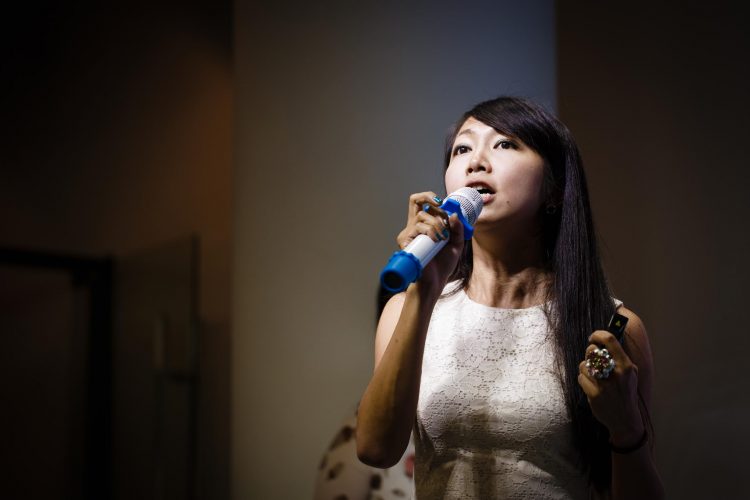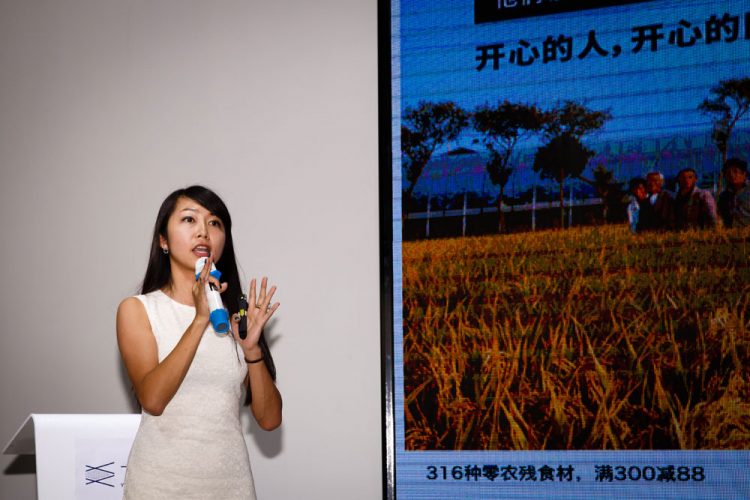
Bits x Bites and Yimishiji founder Matilda Ho.
China is a country that loves to eat, but it has serious problems with food.
The shift from rural socialist agrarianism to urban capitalism over the past three decades has brought millions out of poverty, but it has also given rise to a slew of new concerns. The increased availability and affordability of easy, greasy fast food items has led to an explosion in child obesity. And the shift from local farms towards large-scale factory farms that can feed cities efficiently and cheaply has given rise to a plethora of food safety scandals, in addition to raising concerns about environmental damage and the inhumane treatment of livestock.
What’s the solution? Hack it. Hack it from every possible angle.
Enter Matilda
Matilda Ho didn’t used to care about food. “Before I went to the US for business school, food had zero importance for me,” she told Tech in Asia. In her family, food was just a fuel – just something that you needed to eat enough of to ensure you’d do well in school that day. But living alone in the US, Matilda suddenly had to cook for herself, and the more she thought about food, the more she realized it could be more than just fuel. “I started to learn […] that food can actually serve so much more at a social and experiential level,” she said. And in the more food-conscious US, she saw that food choices can have serious impacts on the environment.
When it comes to food in China, consumers don’t trust anything they see.
After she graduated, food also began to play a role in her professional life. Working in consulting for IDEO in China, she found herself handling projects like setting up Shanghai’s first farm-to-table restaurant. “I started to develop more and more knowledge and experiences in all the challenges in [China’s] food supply chain,” she said. “That’s how I realized that this is something that I really want to tackle.”
So she left consulting and founded Yimishiji, an online farmers market with a focus on healthy and sustainable food products. Early on, the company struggled to educate consumers. “When it comes to food in China,” Matilda said, “consumers don’t trust anything they see.” And the word “organic” doesn’t have the recognition or prestige in China that it enjoys in much of the West. On the other hand, environmental and sustainability concerns are often front-and-center in China, so Yimishiji focuses mostly on the sustainability angle. Using that, it has become one of China’s fastest-growing online farmers markets.
Taking a bigger bite
Yimishiji is doing well, but Matilda wants to do even more. Obviously, a single online farmer’s market isn’t going to be enough to resolve all of the problems with China’s food system. So she founded Bits x Bites, China’s first food-tech-only accelerator and VC.
A food-focused VC is something that Matilda said China’s tech industry desperately needs. “There are more and more entrepreneurs aware of [China’s food system] challenges, but they don’t have enough capital, experiences, or the mentor network to help them succeed and grow rapidly,” she said. Existing VCs and accelerators haven’t been much help because the food industry is different from software-based tech. Seeing returns takes longer, and a lot of consumer education is often required before food products can even carve themselves a solid foothold. But the industry is growing, and the Bits x Bites team is confident that they’ll see returns in the long run.
Consumers are ready for healthier food options, but big companies aren’t providing them.
Matilda is especially confident of this because she sees evidence that China’s consumers are looking for better options. “If you look at large scale F&B companies in China, they have been suffering,” she said, because of food safety scandals and increasing consumer awareness. More and more, she said, consumers are willing to pay a premium for healthier and more sustainable food, but China’s big food and beverage companies simply aren’t offering them that option. The obvious solution: facilitate food related startups so that they can meet that demands.
Bits x Bites is all in on the food industry, and it wants to approach the problem from every possible angle. Matilda said it will consider all sorts of food-focused startups, from online markets like Yimishiji to urban farming kits for consumers, to cricket-flour producers trying to change how China gets its protein. “Those type of startups need a platform, a community, and the access to help them grow,” said Matilda. “That’s why we founded Bits x Bites.”
Bits x Bites begins accepting applications for its first accelerator class this month (the batch will start in February, just after Chinese New Year). It’s also accepting pitches from food tech companies that don’t need the structure of an accelerator and are just looking for VC investment. Details are available in both English and Chinese on the company’s website.
If you are interested, though, you’d better make a good pitch, and quickly. Matilda said that even before applications opened, Bits x Bites was getting inquiries and pitches daily from interesting food tech startups.

Money, food, and the future
Bits x Bites is in an interesting position for a VC. Its chief goal isn’t directly related to financial returns; the accelerator is genuinely looking to solve some of China’s food problems. And Matilda and her team know that in food tech, big returns are probably further off than they might be if the company was making venture investments in a more easily-scalable industry sector. But at the same time, Bits x Bites can’t write off the importance of making returns. “If the startups that we invest can’t scale up or sustain their business models to serve a larger market base, then the impact will also be quite limited.” said Matilda.
Matilda also said that Bits x Bites needs to take a broader approach than other sector-focused VCs might. The problems are so severe and the stakes so high that Bits x Bites simply can’t afford to go all-in on any one approach. There will be nine billion people on earth by 2050, Matilda said, and there’s no way all of them can be fed with conventional organic farming. So Bits x Bites wants to back everything from organic farming to aquaponics to aeroponics. “We think that if we only pick one side it would be too risky,” she said. “We have to embrace different approaches.”
But if things go well, we know a little about what Bits x Bites hopes the future will look like. Its investment thesis, according to Matilda, is: “technology can be a strong enabler to shape the future of good food.” Matilda hopes than in the next five to ten years, more Chinese consumers will be “starting to think about where the food comes from and where it goes,” and that those thoughts will inform decisions about where they buy their food. And of course, Bits x Bites is hoping for a big hit: “There are very very few unicorns in the world right now that are in the food sector,” Matilda said. “We want to invest in more and more companies striving for that scale level.”
This post How a new accelerator aims to solve China’s food crisis appeared first on Tech in Asia.
from Tech in Asia https://www.techinasia.com/bits-x-bites-food-safety-foodtech
via IFTTT
No comments:
Post a Comment